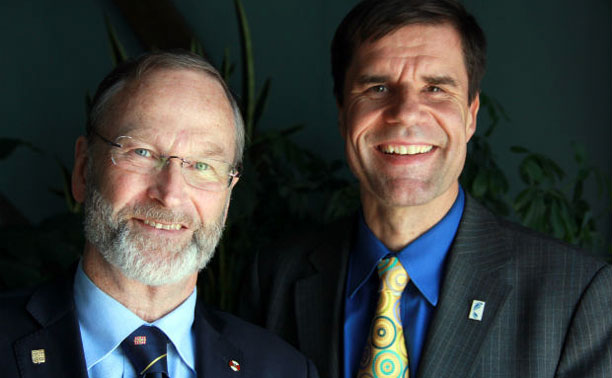
japan honours eco footprint inventors
by Tim Willmott : Comments Off on japan honours eco footprint inventors
Japan’s Prince Akishino and the Asahi Glass Foundation yesterday presented the Blue Planet Prize, one of the world’s premier environmental awards, to Global Footprint President Network Mathis Wackernagel and Dr. William E. Rees, co-creators of the Ecological Footprint, and Dr. Thomas Lovejoy, who was recognized for his work in advancing our understanding of biodiversity.
Two Blue Planet Prizes are awarded annually by the Asahi Glass Foundation to individuals or organizations that make outstanding achievements in scientific research and its application in helping to solve global environmental problems. The prize is considered one of the most prestigious in the field of conservation.
Building on Rees’ earlier work on human carrying capacity, Drs. Wackernagel and Rees in the early 1990s developed the Ecological Footprint, the world’s premier resource accounting system, to track humanity’s demands on nature. Dr. Lovejoy was the first to clarify that human-caused habitat fragmentation damaged biodiversity and gave rise to environmental crises.
The prize was presented yesterday in the Tokyo Kaikan, across from the Imperial Palace, with the Imperial Highness Prince and Princess Akishino, ambassadors and members of the Asahi Glass Foundation in attendance. Dr. Wackernagel has donated his $300,000 share of the prize money to Global Footprint Network to advance the Ecological Footprint work, and has invited supporters to help match the gift.
“I am convinced more than ever that it is possible to turn our economies into stewards of our planet,” Dr. Wackernagel said in his acceptance speech. “We cannot continue forever to take more from the planet than the planet can give.”
Like most nations, Japan is facing resource constraints, but is taking a greater leadership role. As an island nation relying on the importation of an increasing amount of biological resources and energy, it potentially puts itself at risk of supply disruption and/or price volatility. Japan is tackling these challenges head-on and looking closely at its Ecological Footprint.
“We are part of a fabulous community of thousands of people who have contributed to dreaming with us and who are spreading the dream and building tools and projects in order to turn an abstract idea into practice,” Wackernagel said. “Japan, through its Ministry of Environment, was among the first three countries in the world to review and then apply the Footprint, and we appreciate and encourage Japan’s leadership in this domain. The trends are moving fast, and Japan’s firm and fast engagement is essential for making the world—and Japan—a stable place.”
The first Japan Ecological Footprint Report (2009) identified areas of ecological demand and offered policy recommendations to address them. It helped fuel calls to action at both the individual and government levels. In November, WWF-Japan, in collaboration with Global Footprint Network, will launch a second, updated Footprint report for Japan.






Comments are closed